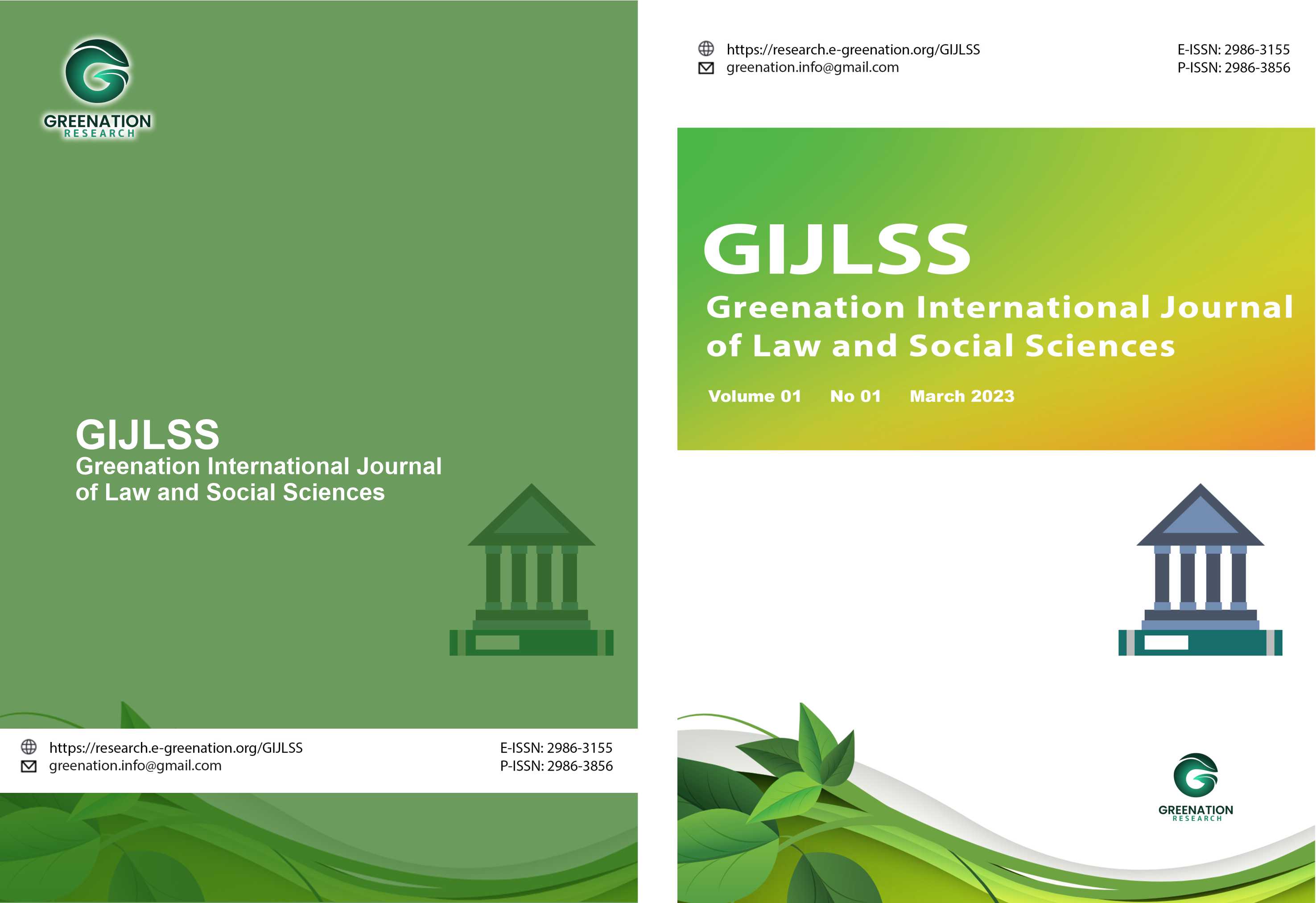Shifting the Burden: Reverse Proof in Shirkah under Islamic Law
DOI:
https://doi.org/10.38035/gijlss.v3i1.369Keywords:
Guaranteeing Capital, Musharakah, Reversal Burden of ProofAbstract
This study examines the concept of reverse burden of proof in musharakah dispute resolution in Indonesia. Musharakah, as a profit and loss sharing-based Islamic economic instrument, faces the challenge of information imbalance between active and passive partners, which disadvantages passive partners in proving loss disputes. This normative research uses statutory, conceptual, and case study approaches to court decisions. The results show that Fatwa DSN-MUI No. 105/DSN-MUI/X/2016 introduces a new norm that allows the manager to guarantee the return of capital if the loss is caused by negligence, exceeding limits, or violating the terms of the contract. This concept is in line with the principle of strict liability and is supported by several scholarly views based on 'urf, tuhmah, maslahah, and dal?lat al-??l. The case study shows that the manager can prove that the business loss did not result from bad faith. The application of the reverse burden of proof in musharakah disputes is important to achieve justice and address information imbalance.
References
Ahmad, G., Rosyid, M., Mudzhar, M. A., & Ritonga, M. R. (2022). Principles of Reversal Burden of Proof in the Perspective of Indonesian Criminal Law and Islamic Law. Jurnal Hukum Islam, 20(2), 355–378. https://doi.org/10.28918/jhi.v20i2.6749
Analiansyah. (2016). Hukum Pembuktian Terbalik dalam Perspektif Hukum Islam. AL-MURSHALAH, 2(1), 38–52.
Analiansyah. (2018). Hukum Pembuktian dalam Islam: Penelusuran Pemikiran Jalaluddin at-Tarusani dalam Kitab Saf?nat al-?ukk?m f? Takhl?? al-Kha???m. Sahifah dan Fakultas Syari’ah dan Hukum UIN Ar-Raniry.
Ayub, M. (2007). Understanding Islamic Finance. John Wiley & Sons.
Candra, M. (2022). AZAS PEMBUKTIAN TERBALIK DALAM SENGKETA PENJAMINAN PENGEMBALIAN MODAL PEMBIAYAAN MUDHARABAH, MUSYARAKAH DAN WAKALAH BIL ISTITSMAR. Mimbar Hukum, 34(1), 237–259. https://doi.org/10.22146/mh.v34i1.2419
Dahwal, S. (2016). STUDY ON THE REVERSE BURDEN OF PROOF BASED ON ISLAMIC LAW AND INDONESIAN POSITIVE LAW. South East Asia Journal of Contemporary Business, Economics and Law, 10(4), 1–6.
Ghoni, A., Dewi, M. N. K., Dewi, S., Awaluddin, & Ginanjar, Y. (2025). The Influence of Islamic Jurisprudence on Modern Commercial Law. Pena Justisia: Media Komunikasi Dan Kajian Hukum, 24(1), 1–13.
Hasanudin, M., & Mubarok, J. (2012). Perkembangan Akad Musyarakah. Kencana.
Khalil, A.-F. A. A., Rickwood, C., & Murinde, V. (2002). Evidence on agency-contractual problems in mudarabah financing operations by Islamic banks. In M. Iqbal & D. T. Llewellyn (Eds.), Islamic Banking and Finance: New Perspectives on Profit-Sharing and Risk. Edward Elgar Publishing.
Kisworo, B. (2012). Urgensi Penerapan Asas Pembuktian Terbalik Menurut Hukum Acara Islam. MIQOT, 31(1), 103–121. https://doi.org/10.30821/miqot.v36i1.110
Lathif, A. A., & Habibaty, D. M. (2022). Harmonization of DSN-MUI Fatwa with Positive Law Study of Legal Bonding of Mortgage Right in Contract for Mudharabah & Musyarakah Agreement. Proceeding International Conference on Law, Economy, Social and Sharia, 290–307.
Lestari, D. M., Kusuma, H., & Sunaryati. (2024). To What Extent Collateral in PLS Financing Brings Ma?lah?ah? An Analytical Comparison from Islamic Law Outlook with Maq??id al-Shar?’ah Index. Al-Manahij: Jurnal Kajian Hukum Islam, 18(1), 109–124. https://doi.org/10.24090/mnh.v18i1.10575
Mohamed Naim, A., Habibi Hj Long, M. N., Abu Bakar, M., & Md Hussain, M. N. (2016). Shar??ah appraisal on the issue of imposing burden of proof to the entrepreneur in trust based contracts. Journal of Islamic Accounting and Business Research, 7(2), 148–169. https://doi.org/10.1108/JIABR-03-2015-0009
Mohamed Naim, A., Md. Hussein, M. N., Habibi Long, M. N., & Abu Bakar, M. (2016). Shar??ah Appraisal of the Concepts of ?am?n, Taq??r, and Ta’add? in Trust-Based Contracts (Uq?d al-am?n?t). Journal of King Abdulaziz University-Islamic Economics, 29(1), 3–20. https://doi.org/10.4197/Islec.29-1.1
Mursid, F., Mukhlas, O. S., Hakim, A. A., & Nur, I. (2023). Perkembangan Akad Mudharabah dalam Fiqh Ke Dalam Fatwa Dewan Syariah Nasional Majelis Ulama Indonesia (DSN-MUI). El-Iqthisady: Jurnal Hukum Ekonomi, 5(1), 61–75. https://doi.org/10.24252/el-iqthisady.vi.38352
Putra, P. A. A., Saripudin, U., & Nurrachmi, I. (2023). The Rulings on Capital Return Guarantees in Mu?a?rabah (Profit Sharing) Contracts: A Comparative Study between The AAOIFI Sharia Standards and the DSN-MUI Fatwas. Al-Iqtishad: Jurnal Ilmu Ekonomi Syariah, 15(1), 89–108.
Rusyd, I. (2007). Bidayatul Mujtahid (A. U. F. Rokhman (trans.); Vol. 2). Pustaka Azzam.
Sitompul, A., Kartika, A., Wahyuni, W. S., & Maswandi. (2022). MONEY LAUNDERING CRIME IN THE PERSPECTIVE OF ISLAMIC LAW IN THE SYSTEM OF PROOF. Justicia Islamica: Jurnal Kajian Hukum Dan Sosial, 19(2), 279–298. https://doi.org/10.21154/justicia.v19i2.3920
Wahyudi, F., Anshari, H., & Jalaluddin. (2024). Hukum Pembuktian Terbalik terhadap Penyelesaian Sengketa Ekonomi Syariah yang Berbasis Akad Kerjasama. Proceeding International Seminar on Islamic Studies, 398–404. https://doi.org/10.3059/insis.v0i1.18391
National Sharia Board Fatwa No. 43/DSN-MUI/VIII/2004 regarding Compensation (Ta’widh)
National Sharia Board-Indonesian Council of Ulama Fatwa No: 129/DSN-MUI/VII/2019 regarding Real Costs as Ta'widh Due to Breach of Performance (at-Takalif al-Fi’liyyah an-Nasyi’ah ‘an-Nukul)
National Sharia Board-Indonesian Council of Ulama Fatwa No: 105/DSN-MUI/X/2016 regarding Guaranteeing Return of Capital for Mudharabah, Musyarakah, and Wakalah bil Istitsmar Financing
Religious Court Decision Number 1651/Pdt.G/2019/PA.Tgrs
Downloads
Published
How to Cite
Issue
Section
License
Copyright (c) 2025 Moh Ahza Ali Musthofa, Burhanudin Harahap, Hari Purwadi

This work is licensed under a Creative Commons Attribution 4.0 International License.
Copyright :
Authors who publish their manuscripts in this journal agree to the following conditions:
- Copyright in each article belongs to the author.
- The author acknowledges that the Greenation International Journal of Law and Social Sciences (GIJLSS) has the right to be the first to publish under a Creative Commons Attribution 4.0 International license (Attribution 4.0 International CC BY 4.0).
- Authors can submit articles separately, arrange the non-exclusive distribution of manuscripts that have been published in this journal to other versions (for example, sent to the author's institutional repository, publication in a book, etc.), by acknowledging that the manuscript has been published for the first time at GIJLSS.























